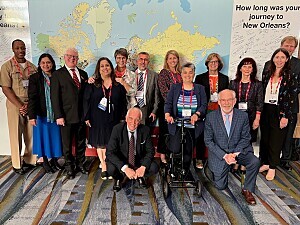For over 20 years, Vanita Aroda, MD, associate physician in the Division of Endocrinology, Diabetes and Hypertension at Brigham and Women’s Hospital, has served as a clinical researcher and clinical trialist for countless studies focused on preventing and treating type 2 diabetes (T2D). Today, as the Brigham’s director of diabetes clinical research, she is a recognized leader as a principal investigator on various global clinical trials, many of which have been part of the regulatory approval process that has led to the broad availability of treatments to patients worldwide.
While Dr. Aroda’s passion for clinical trials began early in her career, her interest in diabetes dates back to before her medical training even started. “I come from a family with a history of diabetes and heart disease,” she says. “I was intrigued by the idea that something should be done to help high-risk individuals understand their risks at an early stage so we can intervene during that sweet spot of prevention.”
Since joining the Brigham in 2018, Dr. Aroda has spearheaded several high-profile trials of new therapies, especially GLP-1 receptor agonists such as semaglutide. She has published and presented extensively in this area, including at the annual American Diabetes Association (ADA) and European Association for the Study of Diabetes (EASD) meetings. She has also been instrumental in writing diabetes care guidelines at national and international levels.
SELECT Study Helps Redefine Obesity Management
One of the first studies Dr. Aroda helped to launch at the Brigham was the multi-center SELECT study. Due to be completed in 2023, the trial investigates the impact of semaglutide on cardiovascular disease outcomes in overweight and obese people without T2D. It is the first pharmacotherapy study in obesity designed to evaluate for cardiovascular outcome superiority.
Dr. Aroda was closely involved in developing programs for the GLP-1 receptor agonist class of medications (including semaglutide) as they were studied and eventually approved for the treatment of T2D. She says the SELECT study will evaluate semaglutide in the treatment of obesity and prevention of cardiovascular disease as well as its benefits on cardiovascular risk factors, including glycemic control and other metabolic measures.
“This study is a good example of the prevention-focused interventions that piqued my interest in the field of endocrinology,” she says. “It will help us determine whether the medication that was shown to reduce risk of heart disease in people with T2D also provides the same benefits to those who are overweight and at risk of developing diabetes and heart disease.”
PIONEER and PIONEER-PLUS Studies Investigate Oral Glucose-lowering Medications
Dr. Aroda also served as the site and lead investigator of the PIONEER 1 trial (results published in Diabetes Care), which evaluated the efficacy and safety of semaglutide as monotherapy in patients with T2D. The trial, conducted in 93 sites over nine countries, was the first phase 3 trial to evaluate an oral version of the drug, which had been previously available only as a subcutaneous injection.
“In addition to high glucose-lowering efficacy, the oral version of semaglutide was found to help patients decrease their weight, which is an important co-morbidity to diabetes,” she says.
Now, Dr. Aroda is the principal investigator on a follow-up study, PIONEER PLUS, which will evaluate whether higher doses (25 mg and 50 mg) of oral semaglutide are more effective in treating T2D than the currently approved 14 mg dose.
“Although previous studies showed that patients with T2D benefited with the now-approved oral semaglutide doses of 7 mg and 14 mg, approximately 20% to 40% of patients did not achieve the recommended HbA1C level of less than 7%,” she says.
Investigating Duodenal Mucosal Resurfacing Benefits
Among the clinical trials in which Dr. Aroda’s group is participating is one that doesn’t involve medications. The REVITALIZE 1 study, which is currently recruiting participants, will evaluate the efficacy and safety of duodenal mucosal resurfacing (DMR) using the Revita® system in subjects with T2D on insulin therapy.
Active DMR treatment will include hydrothermal ablation of the duodenal mucosa in an upper endoscopic procedure. The comparator treatment will include an upper endoscopic procedure similar to DMR treatment without hydrothermal ablation of the duodenal mucosa. Glycemic, hepatic, and cardiovascular endpoints will be measured.
“This early-stage, investigational study is looking to see whether this treatment can help reduce insulin requirement and target more proximal causes of hyperglycemia,” Dr. Aroda says.
Translating Research Findings Into Clinical Practice Guidelines
Dr. Aroda’s firsthand clinical trial experience has given her a unique perspective on the role of therapeutics in the treatment of patients with diabetes. Her sought-after translational expertise has made her an instrumental contributor to developing patient care guidelines.
She currently serves on the ADA’s Professional Practice Committee, which reviews and updates the annual Standards of Medical Care guidance. In addition, she has led updates and revisions for the Pharmacologic Approaches to Glycemic Treatment section, the Prevention or Delay of Type 2 Diabetes and Associated Comorbidities, and the Comprehensive Medical Evaluation and Assessment of Comorbidities section and is an active reviewer and contributor for all sections of the guidelines. She also serves on the international ADA-EASD Management of Hyperglycemia Consensus Working Group, which released its draft guidance for public comment at the recent ADA Scientific Sessions.
Dr. Aroda credits the Brigham’s culture of exploration, collaboration, and contribution for allowing her to make a meaningful difference in the field of diabetes care.
“The Brigham is a place where every person can be their best person and contribute their own unique skills and talent,” she says. “There is a lot of space for personal and professional growth at all levels, and I am honored to support our fellows, residents, and undergraduate scholars as they embark on their own research around cardiometabolic diseases.”
